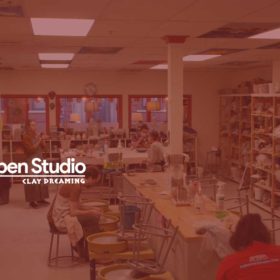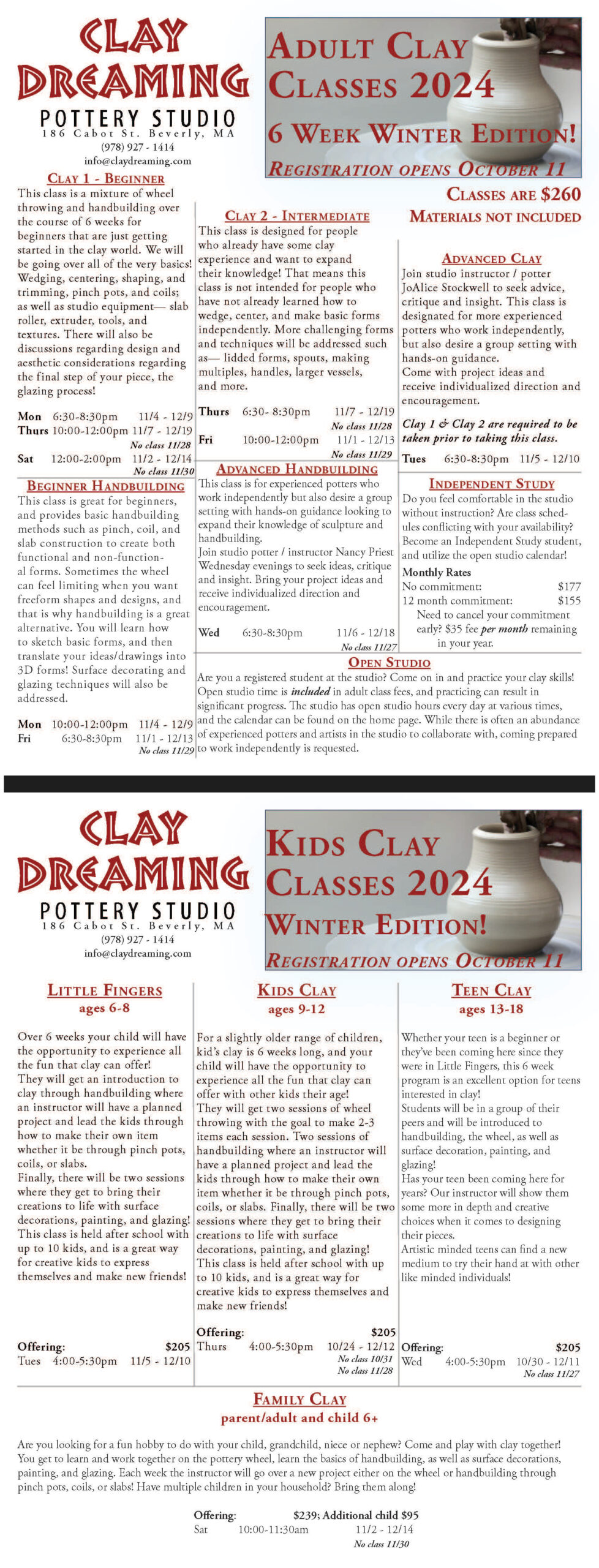No experience?
Not "Artistic"?
Monday: 10:00 am - 7:00 pm
Tuesday: 10:00 am - 7:00 pm
Wednesday: 10:00 am - 7:00 pm
Thursday: 10:00 am - 9:00 pm
Friday: 10:00 am - 9:00 pm
Saturday: 10:00 am - 9:00 p.m
Sunday: 11:00am - 7:00pm





The cost of starting pottery varies depending on the equipment and materials. If you’re purchasing a wheel, kiln, and tools, the initial investment can be high. However, many studios offer affordable beginner classes where materials and tools are included. These classes allow you to try pottery without the upfront costs. At studios like Clay Dreaming, classes offer a more cost-effective way to explore pottery.
The time it takes to learn pottery depends on how often you practice and your learning pace. Typically, it takes 2-3 months of regular classes or practice to grasp basic techniques like wheel throwing, handbuilding, and glazing. Mastery takes longer, but beginners can see significant improvement within a few weeks to months, especially with professional instruction.
Yes, anyone can improve at pottery with consistent practice and patience. Pottery is a skill-based craft that involves mastering both technique and creativity. While initial attempts may be challenging, anyone can become proficient with dedication. Classes at a studio, like those offered by Clay Dreaming, provide structured learning and valuable feedback, which accelerates progress.
Self-teaching pottery is possible with online tutorials and practice, especially for basic techniques like handbuilding. However, learning from a professional can significantly speed up your progress. Kiln firing, advanced wheel techniques, and glazing often require guidance, and studios provide essential equipment that most beginners don’t have at home.
Beginners should start with handbuilding techniques such as coil building, slab construction, and pinch pots. These methods are easy to learn, don’t require a wheel, and build a strong foundation for more advanced pottery skills. Handbuilding allows you to understand how clay works before moving on to wheel throwing, which is more complex but very rewarding.
Pottery can be challenging, but it’s not inherently difficult. Like many crafts, it requires time, patience, and practice to develop the necessary skills. Many beginners find it relaxing and rewarding once they get past the initial learning curve. Techniques like centering clay on the wheel may be tricky at first, but they become easier with experience.
Pottery classes can be messy, especially when working with wet clay and glazes. The process involves getting your hands dirty, and stray bits of clay and glaze are inevitable. However, studios are equipped to manage the mess, and protective aprons are usually provided. Learning to work with clay in a controlled manner helps reduce mess over time.
While you can use a regular oven to dry clay (called air-dry clay) or polymer clay, it cannot reach the temperatures needed for traditional pottery. A kiln is essential for firing ceramic pieces, as it heats up to over 1,800°F to harden and vitrify the clay. If you plan to work with real clay, you’ll need access to a kiln for proper firing and finishing.
Learning pottery basics can take just a few days, but becoming proficient takes longer. A single pottery class can introduce you to the basics of clay shaping and wheel throwing, allowing you to create simple pieces in a matter of hours. However, it typically takes several weeks of practice to refine your skills and produce more complex pottery.
Pottery is not gender-specific—it’s a creative and functional art form enjoyed by people of all genders. Historically, pottery has been practiced by men and women in different cultures for centuries. Today, pottery attracts a diverse group of people, from hobbyists to professional artists. Whether you’re interested in pottery for its artistic, therapeutic, or functional aspects, it’s a hobby for everyone.
Beginner potters typically need basic tools, including clay, a sponge, a wooden rib, a needle tool, and a wire cutter. For handbuilding, minimal equipment is required, but wheel throwing may involve access to a pottery wheel and, eventually, a kiln for firing. Many pottery studios provide all necessary materials, allowing beginners to focus on learning without investing heavily in equipment upfront.